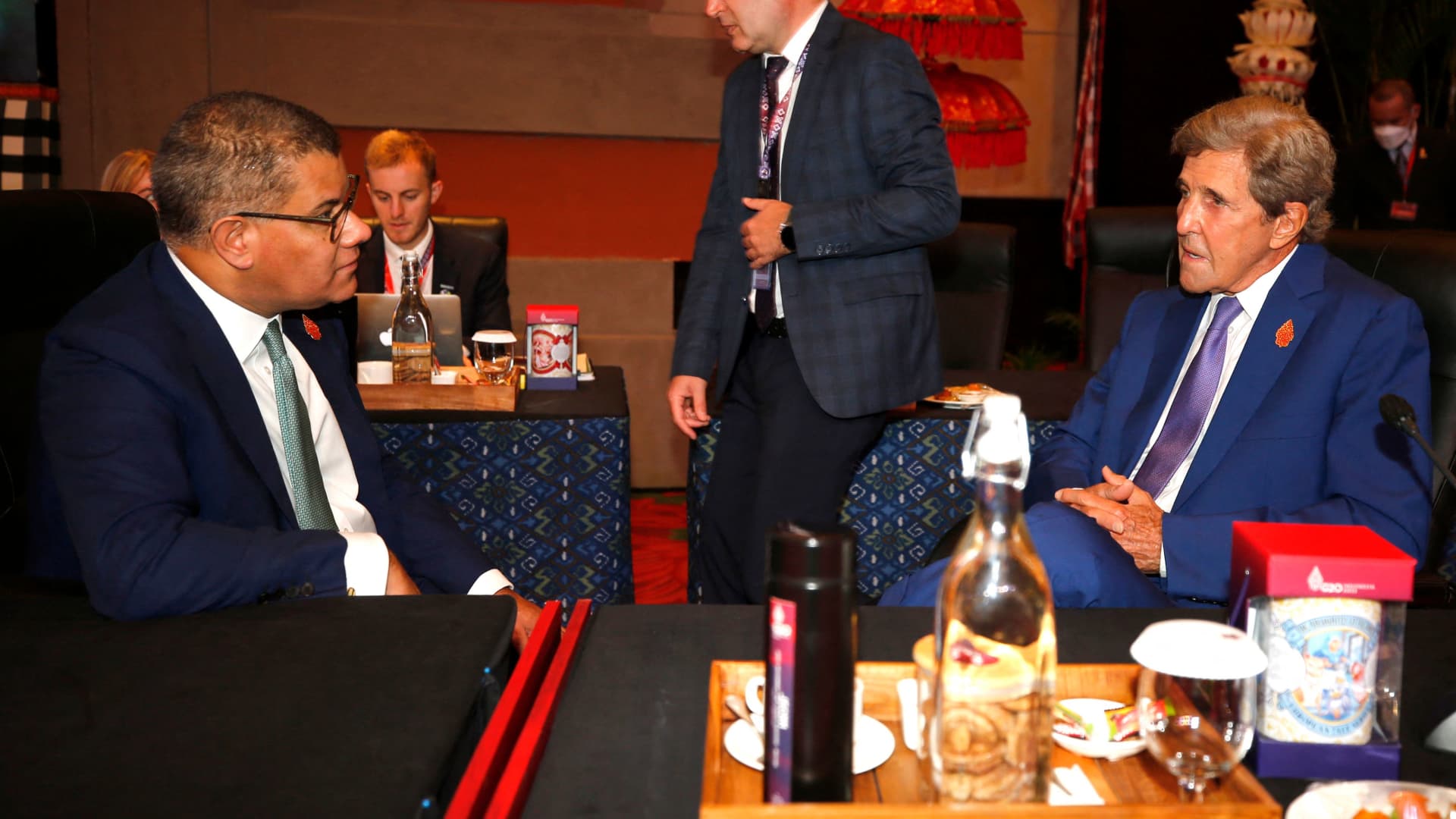[ad_1]
U.S Special Presidential Envoy for Climate John Kerry (right) with President of COP26 Alok Sharma at the G-20 Joint Environment and Climate Ministers’ Meeting in Nusa Dua, Indonesia’s Bali island, on Aug. 31, 2022.
Firdia Lisnawati | Afp | Getty Images
BALI, Indonesia — G-20 ministers have gathered in Indonesia to discuss their progress on carbon emissions. But expectations are low.
The group of 20 countries represents about 75% of the world’s total greenhouse gas emissions. In 2021, the group recognized that limiting global warming to 1.5 degrees Celsius above pre-industrial levels would require “meaningful and effective” steps.
But there’s frustration about a lack of concrete measures at a time when Russia’s invasion of Ukraine has pushed several governments to continue to use coal for longer than they’d hoped.
“A lot of countries in the world are strongly condemning the Russian aggression in Ukraine … so it’s been hard to have negotiations with the Russians,” Rob Jetten, the Dutch minister for climate and energy, told CNBC in Bali.
Russia is among the G-20 nations. This month, Sky News and others reported that Russia is flaring off natural gas that it would normally have exported to Europe. According to the G-20 host nation, Indonesia, Russia’s President Vladimir Putin will take part in a leader’s meeting scheduled for November.
“There’s also a huge energy crisis, worldwide prices are high, people are struggling to pay for energy. And this is also … not helping climate actions, because a lot of countries are going back to fossil fuels again,” Jetten said.
In the wake of the Kremlin’s unprovoked invasion of Ukraine and the disruption of natural gas flows from Russia to Europe, countries including the Netherlands, Germany and Austria said they would have to burn more coal — a fossil fuel.
Other parts of the world have stepped up their consumption of coal, including China, which has experienced a severe heat wave this summer and is using record amounts of energy.
Those decisions, even if temporary, diverge from previous agreements.
An official from one of the participating nations, who did not want to be named due to the sensitivity of the negotiations, said the main challenge going into these meetings is “how can we keep countries following (climate) targets.”
Read more on climate change
“Many (nations) are trying to be flexible. Can we please keep the targets?” the official said.
The Indonesian government acknowledged the negotiations are tough.
“The discussion on the commitment is rather challenging as it brings certain implications to some member countries,” the Indonesia presidency of the G-20 said in a statement ahead of the meetings.
“The current geopolitical condition also create(s) a challenge in the ongoing negotiation process,” it added, in reference to Russia’s invasion of Ukraine.
Tanya Plibersek, Australia’s minister for the environment and water, said Russia’s attack on its neighbor has “complicated negotiations. But there is no way that countries could ignore that illegal invasion of Ukraine. It has to be something that is talked about in international meetings like this.”
Meanwhile, extreme weather events across the world would seem to make the need for government action ever more urgent. Pakistan, for example, is experiencing brutal floods, with a third of the nation under water.
A government minister there told Reuters the international community has a “responsibility” to help Pakistan and prevent future extreme weather events, given the country’s carbon footprint is among the lowest in the world.
In Europe, a German drought has reduced water levels of the Rhine River, making it harder to transport fuel, wheat and other items.
“We need to step up our game, and all these extreme weather events all over the world — in Europe, in Asia Pacific, but also in America, [are] our real wake up call, for everyone. that we have to act now,” the Dutch minister Jetten said.
[ad_2]
Image and article originally from www.cnbc.com. Read the original article here.

